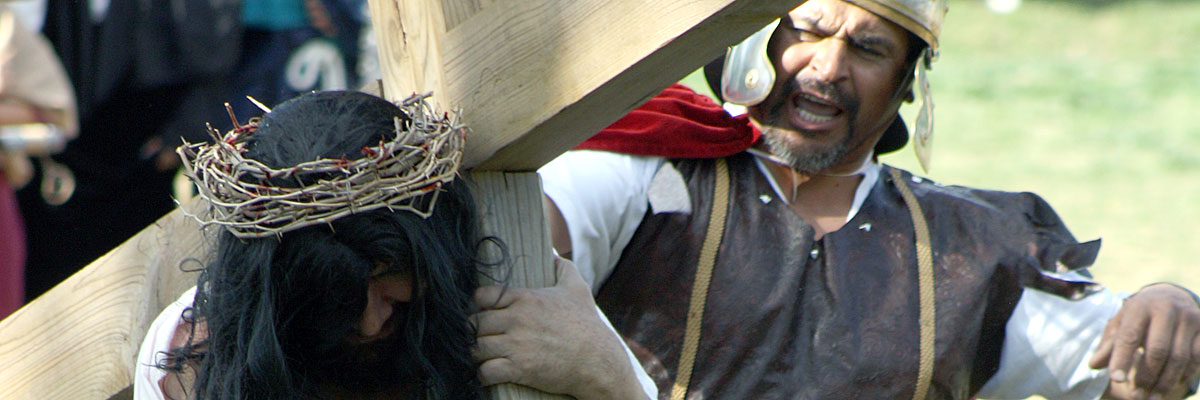Official Website of the
Catholic Diocese of Little Rock
Growing in faith opens us to challenge
Published: June 15, 2013
This is the ninth column in a 14-part series
By Cackie Upchurch
Director of Little Rock Scripture Study
"Where can I run from your spirit? From your presence, where can I flee?" The author of Psalm 139 expressed the profound understanding that God's very presence is reliable and steadfast, even relentless, in our lives. The late 19th century poet Francis Thompson composed "The Hound of Heaven" with the same realization of God's dogged pursuit of each person.
 Faith, then, would seem to be an automatic response to a God who is powerful, creative and persistent. And yet, some respond only half-heartedly and others choose to reject God's initiative altogether. Even those in relationship with God do not always experience God's pursuit or even divine abiding presence. The Scriptures reveal this has ever been the case.
Faith, then, would seem to be an automatic response to a God who is powerful, creative and persistent. And yet, some respond only half-heartedly and others choose to reject God's initiative altogether. Even those in relationship with God do not always experience God's pursuit or even divine abiding presence. The Scriptures reveal this has ever been the case.
The story of Job, "a blameless and upright man," is perhaps the most obvious example of knowing God's presence intellectually but not sensing God's presence in the conditions of one's life. In undeniably bitter circumstances, Job certainly does not experience God's pursuit and has lost outward evidence of being blessed. His friends make matters worse by assuming God is punishing Job and then searching relentlessly for the reason for such chastisement. Bitterness and resentment would be understandable but Job remains faithful.
Centuries later, Jesus would tell his followers to be prepared for the kind of hardship that is captured in Job's story. Foxes with dens and birds with nests apparently will have it better than the followers of Jesus (Matthew 8:18-22). Self-denial and carrying one's cross will be par for the course (Mark 8:34-35). Even being hated and persecuted by others may be part of the experience (John 15:18-25).
While there are many stories of divine encounters that illustrate the power of God to lift people out of despair, restore their dignity and offer liberation from many forms of enslavement, there is little doubt that a life of faith will come with an ample share of hardship and sacrifice. That is the nature of human existence.
Is it in the response to such hardships that we grow as people of faith? A sampling of biblical stories illustrates some of the obstacles that prevent us from experiencing the fullness of God's life.
Consider the story of the faithful man who is attracted by Jesus' teachings and ponders what more he might do to inherit eternal life (see Matthew 19:16-30; Mark 10:17-31; Luke 18:18-23). When instructed to sell his possessions and distribute his earnings to the poor, perhaps we can sympathize with his sad departure.
Sometimes the cost of responding to God seems manageable until we understand that an initial response is not the same as following and that following requires more than we may be prepared to give. The rich man's obstacle to moving deeper into discipleship can be found in his relationship with his possessions.
In John 8:1-11, we find the story of the woman caught in adultery and the Pharisees who bring her forth for condemnation. When tested for his response to this violation of Mosaic law, Jesus simply pointed out that only those without sin could cast the stones that would deliver her punishment. In response, the woman received forgiveness and the men went away. Did they miss the opportunity for conversion because of self-righteousness, or pride, or both?
Jesus told the story of an indebted servant whose plea for forgiveness moved the master to forgive the outstanding loan (Matthew 18:21-35). When that same servant was approached by another man indebted to him, there was no offer of forgiveness; instead, a prison sentence! Requiring full restitution stood in the way of deepening the servant's appreciation of the things of God.
When Jesus passed through a Samaritan village, 10 lepers begged for his pity (Luke 17:11-18). He sent them to the priests and on their way they were cleansed. When only one came back to Jesus in gratitude, glorifying God, Jesus proclaimed that one was saved and he wondered why the other nine did not return. We can wonder whether their lack of gratitude for God's work in their lives prevented them from experiencing deeper healing.
A commitment to grow in faith requires that we embrace the things of God; things like gratitude, suffering along with others, and seeking forgiveness. It also requires that we rid ourselves of the things that are not of God; things like pride, selfishness, resentment and all that prevents us from moving more deeply into life with God.
Study Questions
- What biblical stories come to mind when you consider the difficulties of responding to God in all circumstances?
- How do the stories of faith in the Bible and from those around you encourage you to continue responding in faith to God?
- What types of attitudes or behaviors are important to embrace as you continue your journey of faith?
- As you consider the course of your faith life, when has a sense GodÕs presence or absence caused you to look more deeply for some new direction?
This article was originally published in Arkansas Catholic June 15, 2013. Copyright Diocese of Little Rock. All rights reserved. This article may be copied or redistributed with acknowledgement and permission of the publisher.









